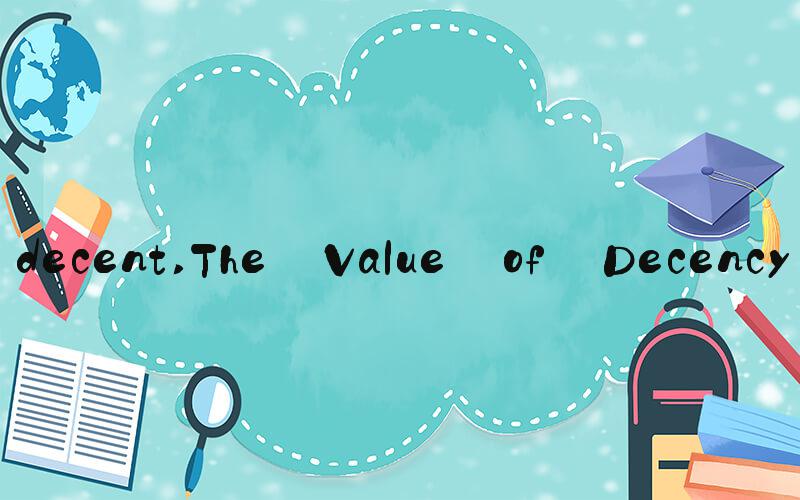 Decent: The Importance of Being a Good Person
Decent: The Importance of Being a Good PersonBeing decent is more than just being polite or following social conventions. It is about being a good person and doing the right thing, even when no one is looking. Decency is a characteristic that can impact our relationships, our communities, and even our world. In this article, we will explore the importance of decency and how it can make a difference in our lives.
The Value of DecencyDecency plays a critical role in our interactions with others. When we are decent, we treat others with respect and kindness. We listen to their perspectives and try to understand their point of view. This fosters trust and builds strong relationships. This is especially important in a world where cynicism, suspicion, and divisiveness are becoming increasingly common.
Furthermore, decency helps us to act with integrity and honesty. When we are decent, our actions align with our beliefs and values. We are accountable for our actions, and we take responsibility for our mistakes. Decency also means treating ourselves with the same respect and care that we would extend to others. This includes recognizing our own limitations, setting appropriate boundaries, and practicing self-care.
The Impact of DecencyDecency not only benefits individuals but also has a positive impact on our communities and society as a whole. When we act with kindness and empathy, we create a ripple effect that can inspire others to do the same. By fostering an environment of respect and understanding, we can promote healthy and constructive discourse, leading to more effective problem-solving and decision-making. A society that values decency is one that is more equitable, just, and compassionate.
In contrast, a lack of decency can have a detrimental impact on individuals and society. It can lead to distrust, animosity, and conflict, creating barriers to communication and cooperation. It can also result in unethical behavior, corruption, and abuse of power. Individuals who lack decency may prioritize their own interests at the expense of others, leading to social inequality and injustice.
How to Cultivate DecencyCultivating decency requires intentionality and effort. It involves developing self-awareness and a willingness to reflect on our actions and behaviors. Here are some ways to cultivate decency:
Practice empathy: Try to understand others' perspectives and experiences.
Show respect: Treat others with respect and dignity, even if you disagree with them.
Be accountable: Take responsibility for your actions and apologize when you make mistakes.
Listen actively: Listen to understand, rather than to respond.
Be kind: Show kindness and compassion to others and yourself.
Practice honesty: Be truthful and transparent in your interactions with others.
Be authentic: Align your actions with your beliefs and values.
Cultivating decency also requires us to recognize and challenge our biases and assumptions. We need to be open to learning from others and to acknowledging our own limitations. This involves engaging in difficult conversations, seeking feedback, and being willing to change our perspectives.
ConclusionIn conclusion, being decent is more than just being polite or well-mannered. It is about being a good person and doing the right thing. Decency fosters trust, promotes healthy relationships, and contributes to a society that values compassion and justice. Cultivating decency requires intentionality and effort, but the rewards are significant. By choosing to be decent, we can make a positive difference in the world around us.
